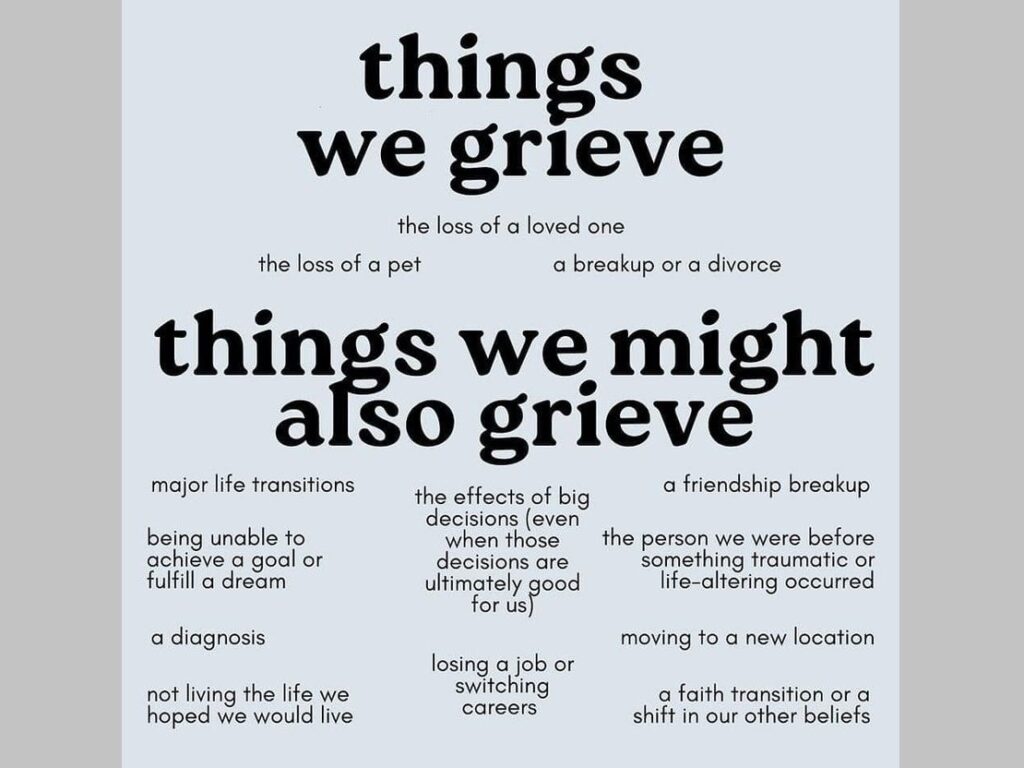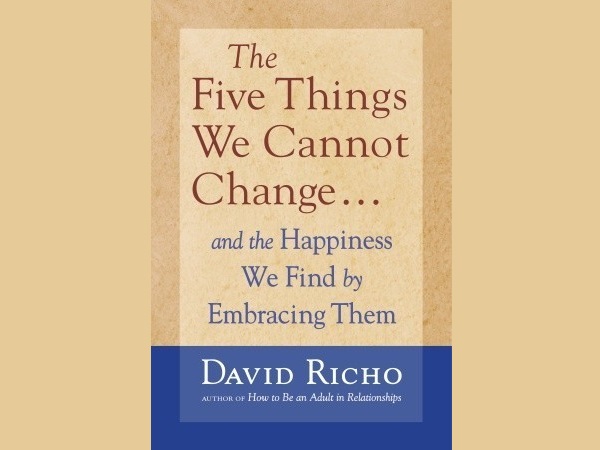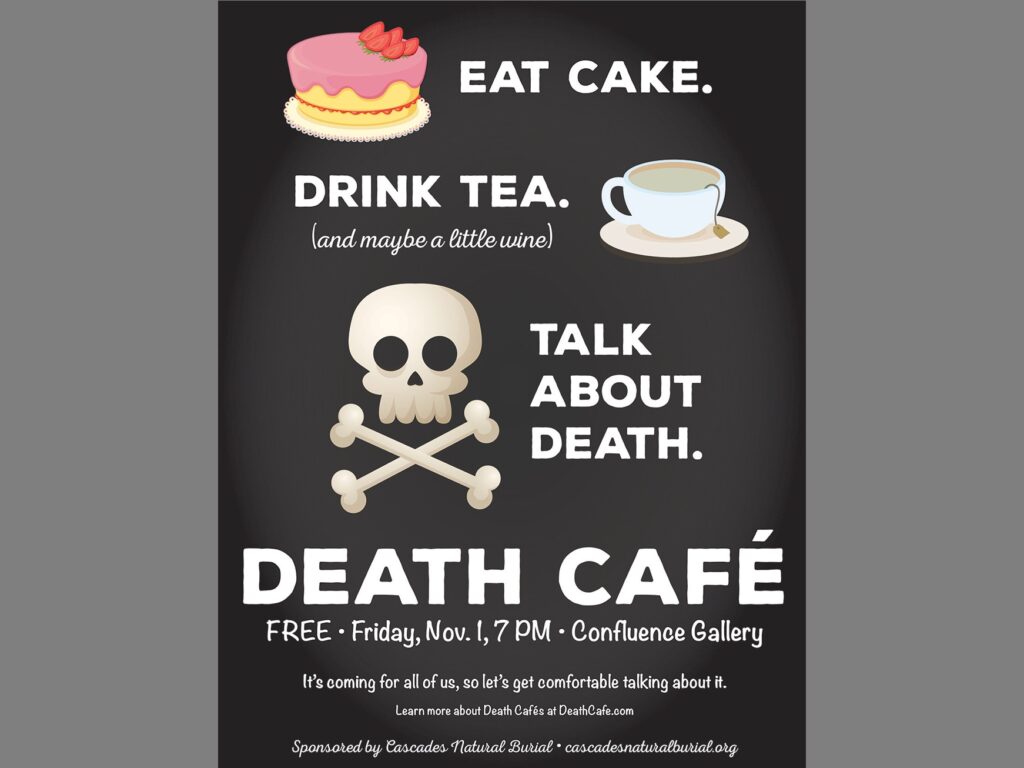In previous years I’ve saved posts about death, transitions, and coping until around Halloween, but I know a lot of people experiencing grief in various forms right now, myself included. It feels like it has been an especially rough few months, and I don’t know how much of that is because there are objectively more things to deal with, because recent events can feel bigger and more intense than those further behind us, because (in my opinion) we’re getting worse with our coping skills in our increasingly digital world, or because of a combination of those things. What I do know is that I don’t have any answers for you in this post, dear reader – just an examination of some of the perspectives that have been shared with me in what feels to be a particularly difficult year.
As I said, there are many forms of grief that anyone might be experiencing at any given time, such as the loss of a friend or loved one, the end of a career, a missed opportunity, the loss of trust in someone else, or even things just not turning out as planned. Whether I’m dealing with my own grief or holding space for others who are grieving, the one thing I try my best to remember (and remind others of as well) is that grieving is a unique and individual experience. Two people are very likely to respond to the same event in completely different ways, based on their own life histories, stress responses, and coping mechanisms.

Image source unknown.
What may seem to be a tragic or stressful situation to one person may seem completely manageable to another – but that doesn’t mean the former is overreacting or incapable. Simply because one person deems a certain scenario to be manageable, that does not invalidate the feelings of fear or loss that someone else might experience in the same situation. Suffering isn’t a competition, and there is no universal standard for pain (or how it is expressed or dealt with). One other thing I’ve been reminded of lately is that it’s ultimately better to acknowledge and deal with your feelings rather than try to push through them and be strong. In fact, it’s the act of addressing those feelings that can make us more resilient in the long run.
The Things We Cannot Change
My therapist is always giving me great reading recommendations, but there is one book she has referenced more often than others in our conversations: David Richo’s The Five Things We Cannot Change… and the Happiness We Find by Embracing Them.[1] In his book, Richo identifies five common truths of the human experience, illustrating that our resistance to those truths can perpetuate unhappiness in our lives. Those unavoidable “givens” in life are as follows:
- everything changes and ends,
- things do not always go according to plan,
- life is not always fair,
- pain is a part of life, and
- people are not loving and loyal all the time.
The first time my therapist recommended I read it, she listed the five things in our conversation, and I did not feel comforted by hearing them – quite the opposite, in fact. In retrospect I would venture to say that I was not ready to hear them, let alone accept them. At the time it hurt just to think that they had to be true. Nine years after that initial book recommendation, I still haven’t fully accepted them, but when revisiting this list recently, it felt more like a tool I could apply to support me through hard times.

Image credit: [2]
All five are important lessons, and all five have been relevant to my life this year, but the one I’ve felt most keenly in the past few weeks is the first one: everything changes and ends. I’ve been reminded many times recently that nothing lasts forever. In some ways, that can be a good thing (e.g. innovation in the business world is difficult but necessary to stay relevant); in other ways, it can be heartbreaking (e.g. the end of a relationship when we’re not ready to let go). But ultimately it is the finite nature of our lives that make them so precious.
At the Risk of Sounding Trite…
I recently reminded my husband that his level of frustration in a given situation was directly proportional to the gap between what he believed should be the case and what was the case. (Kettle, meet Pot.) I still believe that life should be fair, people should be honest, and we should always get to live long, happy lives with those we love. But I also recognize that that isn’t the case. Part of why I think we have so much difficulty dealing with these truths is that we tend to avoid talking about things that make us uncomfortable. Meanwhile, it’s also a truth of life that avoiding things because they’re uncomfortable means we’re likely robbing ourselves of opportunities for growth.
Recognizing that life is finite and long life is not guaranteed can give us the encouragement to cherish the moments we have when we have them. (And I’m using people and death here as an example, but it could be anything that might cause grief, like moving to a new home or changing jobs.) I recently learned about death doulas, who help individuals and families deal with the transition from life to death.[3] Hearing one speak about her personal journey and those she’s helped was eye-opening from the standpoint of 1) normalizing conversations about death, which leads to 2) identifying our own wants and desires related to our lives, and 3) working toward those ends while we’re here.[4]

Image credit: [5]
When it comes to normalizing conversations, not everyone is ready or able to do that, but some people are, and some of those people hold events called death cafes. Now a global phenomenon, death cafes are venues for discussions that can cover anything related to the subject, always with the goal of illuminating and normalizing, in order to help people “make the most of their (finite) lives.”[6] I have known about death cafes in Pittsburgh for several years, but while I’ve always wanted to go to one, I haven’t… yet. I think I may soon, and if I do, I’m sure I will have insights to share.
For the record, I don’t think that being mindful and intentional with people while they’re here will reduce our pain once they’re gone. I do think that taking the time to recognize the finite nature of our lives, relationships, and situations can help us appreciate them more when they’re here. And maybe doing that can provide us with more happy memories and even limit the regret we might feel over opportunities not taken. I don’t know, but it’s a thought, and I would love to hear what you think below.
If you are grieving a loss or preparing for one, I wish you peace, comfort, and the space to process it in a way that works for you.
Thank you for reading.
[1] https://www.goodreads.com/en/book/show/555253
[2] https://www.goodreads.com/en/book/show/555253
[3] https://www.nytimes.com/2021/06/24/well/doulas-death-end-of-life.html
[4] https://www.ted.com/talks/alua_arthur_why_thinking_about_death_helps_you_live_a_better_life
[5] https://cascadesnaturalburial.org/death-cafe/
[6] https://deathcafe.com/what/
0 Comments